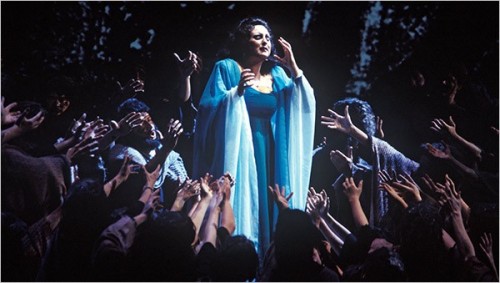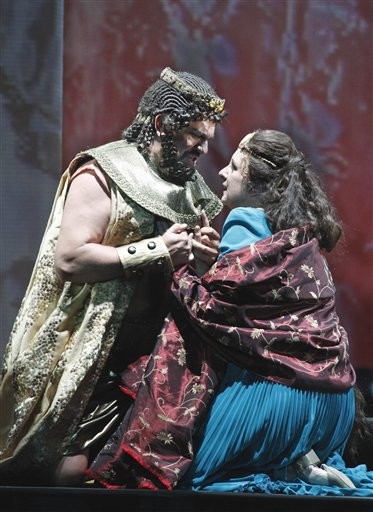Lauren Flanigan at the Graduate Center, CUNY
The Art of Monodrama
By: Susan Hall - Mar 03, 2010
Lauren FlaniganElebash Recital Hall
The Graduate Center
The City University of New York
March 2, 2010
As Lauren Flanigan swept onto the Elebash stage at the CUNY Graduate Center in New York in a slinky blue dress she'd bought for the occasion, she tipped her hat to the gentleman who introduced her. "A thinking man is introducing the diva." The tag "thinking man's diva" follows Flanigan, but it suggests that her singing is intellectual and that is not what registers at first. She is a singer of high emotional drama backed up by a soprano of great beauty and power.
This evening addressed "The Art of the Monodrama." At the outset, Flanigan defined her term, sending her students in the audience scuttling to Wikipedia. "A drama acted by a single person...everything that one witnesses on stage is portrayed from the mental state of a given protagonist."
Flanigan set the evening as A Room of One's Own, with marvelous actress Ellen Lauren performing passages from Virginia Wolff's classic essay (adapted by Jocelyn Clarke) interspersed throughout the songs. This anchored us in the concept that women artists need their own space to function. Each of the pieces presented by Lauren, Flanigan and a final surprise, jazz singer Annie Ross, came from this zone. Flanigan's ability to pull all the strands together suggests what a compelling actress she is.
Flanigan started with Try Me, Good King (2007) by Libby Larsen. She sang The Last Words of the Wives of Henry VIII. These gallows' speeches were the connective through line in Flanigan's voice.
Flanigan reports always trying to take herself out of a comfort zone -- where she falls into a rhythm and forgets what she is doing. Her capacity to stay in the thrilling present moment is striking. She moved on to the Ophelia Lieder of Richard Strauss. Often these songs are sung as though Ophelia were going mad. Flanigan chooses to sing them as a woman fighting for her sanity.
"I always take the role apart," Flanigan says, "and completely re-examine why I'm doing it. You can call Violetta a lot of things; you can call her a member of the demimonde, but what is that really? She is a self-educated, self-made creation, just like Madonna. On one level she commands respect; on another, she's not taken seriously. No matter how smart she is, she is a person who offers services that are paid for."
Interestingly, the subjects of the evening's songs were often characters from Shakepeare. There was a lovely song about Desdemona by Susan Botti, and a fascinating Lady Macbeth composed for Flanigan by Thomas Pasatieri. Here she pointed out that Pasatieri is romantic, and that she wanted to work against that. "Figuring out the composer's intent is not the only way to do a piece."
Both Lauren and Flanigan made striking use of their hands and arms. The voice, whether delivering word or notes, can not be touched. (A violin can be). Watching a recording session, you observe singers embracing the air-that-is-sound in gestures both grand and miniscule. The urge to touch must be great. It is expressed, but contained, by both these actresses. Lauren, for instance, holds her hands behind her back as Wolff thinks, and then shoots them wide for the big ideas and feelings. Extremely effective.
While she soared as Esther at the City Opera last fall, Flanigan is hardly front and center at the Metropolitan Opera. The role of Elektra cries out for her interpretation.
Quite accidentally, the gown in which she was swathed this evening is shaped like the signature wardrobe choice of the Met's General Manager, seductively caressing the body with deep decolletage. Flanigan intuitively complies with the Met's needs, including the delivery of a voice that is perfect for the early Verdi roles she has often created elsewhere. Casting is a mystery, but Flanigan is certainly not as compliant as say Renee Fleming.
Flanigan and Riccardo Muti worked out their differences over "Nabucco" at La Scala. Flanigan had appeared in trendy pink-tinted oval glasses and Muti called her "California." (She was born in San Francisco). She drank water on stage and Muti said, "...you never saw Caruso walking around with a bottle of water."
"But in the end, we got along fine," says Flanigan. I achieved his standard; it was hard to do, but worth it. And I didn't have to act like a diva."
Perhaps if Muti returns to conduct at the Met, he can induce Met management to embrace Flanigan. Certainly the audience this evening did -- as a most exciting singer of originality and revelation.
The evening ended with a Johnny Mercer song, "I wonder what became of me," sung by Annie Ross, the jazz artist. It was on point -- and its own story lasting under three minutes.





